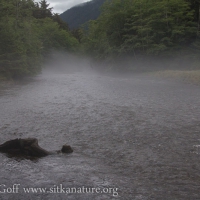It rained for much of the day, continuing the weekend trend (which peaked yesterday with 3.8 inches). This evening I decided to head down to the park and see if I could get a picture of some of the low-lying fog I had seen on the water earlier in the afternoon. While walking, there were a couple of light showers, but temperatures remained pretty warm at 64F, and I was in no danger of getting chilled. In fact, it felt quite muggy as relative humidity was up over 90%. Let’s just say the air was saturated.
I did not end up finding any fog out on Crescent Bay, but I did get distracted by bunches of insects (mostly aphids and various flies) on fireweed plants along the sea walk. I stopped and took some photos before proceeding on towards the park.
The tide was falling and, closer to low than high, the flats were a bit larger than I wanted to walk. I did go down near the water’s edge in front of the visitor’s center after seeing some shorebirds flying down that way. I missed them (whether they flew or walked off when I wasn’t watching, or I just didn’t see them, I’m not sure).
As I moved up the beach toward the forest, various smells hung heavily on the still air. I recognized one smell that seemed like Sitka alder, though I had not remembered noticing it along this section of shoreline. A quick look around confirmed that my nose had found what my eyes had not previously, there was a Sitka alder growing nearby. I think I was also picking up the smells of Pacific Hemlock-parsley (Conioselinum gmelinii). I also had the sense that the warm, wet air was particularly effective at carrying the smell of overgrown leaves, whose parent plants are already responding to the rapidly diminishing day length and beginning to pull back down to the roots, leaving those leaves to decay and fall.
Crossing over the long-stranded beach logs and under the drip line on to the forest trail, I found a hint of fog blurring the already muted light. A pair of recently fledged Hermit Thrushes hopped and flitted along the ground along side the trail before crossing in front of me and heading into the deeper forest. Bright red huckleberries broke with the late summer theme of deep greens and brown, and the smell of spruce was strong. It seems to have been a tough year for many spruce trees, as they have shed most of their needles that were not this year’s growth. Miniature terraces of needles organized by slowly moving water over relatively flat ground form interesting patterns at the edge of the trail. I wonder if the spruce smell, seeming more intense than normal, comes from the release of volatile compounds by all these needles in early stages of decay.
Out on the flats at the end, I noticed some fog over the water towards Cannon Island. I did not realize how quickly it was dissipating at first, but within just a few minutes it was pretty much gone. I cut back on the trail over to the river, and found the fog still lying over the river between the trees, spreading and thinning only after the river went round the bend where a rock wall barrier was constructed to keep river and ocean from eroding the land at Arrowhead Trailer Park.
I saw a couple of people I know floating at the upper edge of a trail-side pool. They had hauled small kayaks up the beach in order to float the river back to the ocean. After our brief conversation, I watched them fade into the fog before I turned and headed home. It was on the way home that I really noticed how muggy it was. Despite walking at a normal (steady, but not fast) pace on flat ground, I felt sweat starting to bead up on my forehead and by the time I got home, I was feeling more like I might after a good walk up one of our local mountain trails.
I’m glad I don’t live in a place where dew points routinely get up into the 60s and higher, but I did enjoy the experience of getting out on this evening to have a taste of that kind of weather. Not only was it interesting to experience the ways it changed what and how I observed, but it helps me appreciate the generally cooler conditions that prevail.
